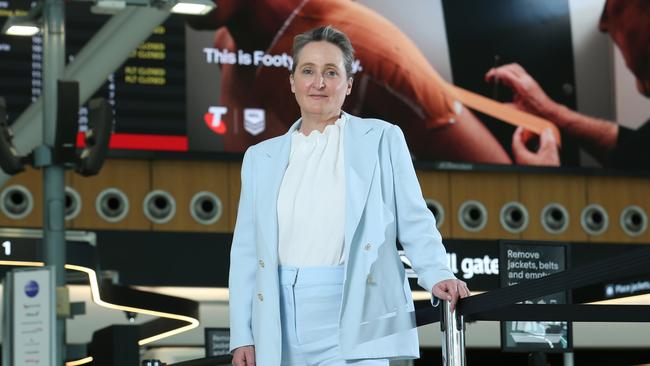Qantas CEO Vanessa Hudson: Australians still place great value on travel
The Qantas boss says this will be a watershed year as more new aircraft arrive giving greater choice to passengers.

Economy
How would you rate the momentum of the Australian economy as we head into 2025? Official forecasts have Australia trimming interest rates from the first half of calendar 2025, is that consistent with your view? What are you seeing around inflation in your own business?
It’s interesting to see how consumer spending habits have changed in recent years with
a continued prioritisation of travel over other spending. Even as people tighten their
belts due to cost of living concerns, we continue to see strong demand for travel.
Qantas is continuing to see demand for premium leisure experiences and a return of
more business travel, while Jetstar is benefiting from increased demand for low fares as
many Australians grapple with the higher cost of living.
As we head into 2025 our forward bookings and market research continues to show that
high priority on travel continuing.
Like many other businesses across the economy. inflation is having an impact on us and
we are seeing cost increases coming through. We expect these to slow in the year
ahead and have focused on offsetting some of these costs through efficiency gains,
such as more fuel efficient aircraft and transformation.
Outlook
What excites you heading into 2025? Are you likely to increase, hold steady, or trim your investment spend?
2025 is going to be an exciting year for us because we have a lot of brand new aircraft
arriving as our fleet investment continues to increase.
Qantas’ first Airbus A321XLR is expected to arrive in April, which is one of 20 new
passenger aircraft we’re receiving this financial year. We also have new aircraft arriving
for Jetstar and our regional airline.
Most obviously these new aircraft mean our customers will have an improved
experience when flying with us. But they also have more seats, and they mean we can
add more capacity which will help put downward pressure on domestic fares.
These next generation aircraft are more fuel efficient, more economic to run, and their
extended range means we’ll be able to operate new routes that weren’t possible on
previous generation aircraft.
They also mean more promotions and training opportunities for some of our pilots and
cabin crew
Reform
As we move into an election year, in your mind, what’s the single biggest lever that can/should be used to lift Australia’s competitiveness or productivity? This could be across any area from labour market, tax reform, training or other areas to encourage investment.
The lack of productivity growth is a real issue for many businesses across the economy.
We’ve seen some of our costs grow without any associated benefits that would help
mitigate the impact.
One of the best opportunities to unlock higher productivity is through reducing
overlapping red tape across Federal and State governments. This will encourage more
private sector investment which is key to getting productivity moving again.
For Qantas, were investing heavily in our fleet, as well as our people and training, both of
which will deliver productivity benefits as well as a better customer experience.
Geopolitics
Will a Donald Trump presidency have a potential impact on your business or sector (tariffs or streamlined regulation)? Does geopolitics drive a bigger part of your decision-making?
As an international airline we’re used to managing uncertainty caused by changing
governments and major geopolitical events.
So while there are heightened geopolitical issues in some parts of the world at the
moment, it’s not driving change in our long term decision making.
Sometimes if they’re prolonged events, they can affect fuel, foreign exchange rates and
travel demand patterns. We’re fortunate that our assets are mobile, and if we see
demand impacted in one area we can redeploy our aircraft relatively easily.
People
Has your organisation’s approach to flexible working – including working from home – evolved during the year. Is this likely to change further into 2025?
Most of our people are working at airports, on aircraft or in hangar, so working from
home isn’t an option.
For our staff in our offices, we’ve been consistent for a while now that we want the
majority of our people in the office for the majority of the time, but with flexibility within
that. Aviation is complex and fast moving so having people in the room helps with the
speed of decision making.
Technology
Where is your organisation along the AI journey – is it in the developmental stage, or are you now using the technology at scale across your business? If so, are benefits matching the promise?
The potential of AI in aviation is massive, and I don’t think there’d be any airline who
thinks they’re using it to anywhere near it’s potential at the moment. Like a lot of
businesses we are using AI but still have some work to do to get the most out of it. I’m
just as excited about what it can do it for our customers as what it can do to help our
people.



To join the conversation, please log in. Don't have an account? Register
Join the conversation, you are commenting as Logout